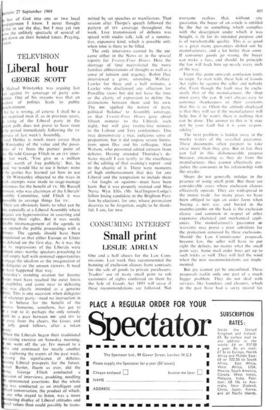TELEVISION
Liberal hour
GEORGE SCOTT
Michael Winstanley was arguing last against Tv coverage of party con- rences. One of his reasons was that an erdose of politics leads to public nchantment.
But he is wrong, of course. I shall be a Ust surprised man if, as in previous years, e rating of the Liberal party in the nion polls does not prove to have risen the period immediately following the TV posure of last week's Assembly.
Lord Henley is much more aware than r Winstanley of the value and the possi- Ries of TV from the parties' point of w. He told George Ffitch in an Iry inter- w last week, 'You give us a million unds' worth of free publicity'. But, he ded, 'we would like to use it better: none the parties has learned yet how to use
Dr Winstanley objected to the ways in loch attempts were made to stage-manage nferences for the benefit of Tv. Mr Russell hnston, who was chairman of the Liberals' s,embly Committee, told Ffitch it was nIssible to arrange things for TV. There are obviously limits to what can be ne. especially at a Liberal Assembly where -legates are hypersensitive in asserting and atecting their rights. But it was surely gable mismanagement of the agenda to e opened the public proceedings with a super. The agenda should have been nipulated so that either Europe or Ulster debated on the first day. As it was the st TV impressions of the Liberals were ndued ones; worthy speakers preaching to halt-empty hall with minimal opportunities engage the idealism or the imagination of delegates or the unseen viewers. It need have happened that way.
),aurday's standing ovation for Jeremy orpe must have reached the outer limits credibility and came near to debasing It was clearly intended as a genuine ute. This is one occasion when delegates It whatever party—need no instruction in to behave for the benefit of the neras. Someone, somehow, has got to t a stop to it; perhaps the only remedy uld be a pact between BBC and Try to away from the cheers, the kisses, and Jolly good fellows, after a token mute.
\\ hen the Liberals began their traditional d-raising exercise on Saturday morning, BBC went off the air. ITV moved to a t-ho and continued for nearly another ur. exploring the events of the past week, ∎ I !sing the significance of debates, e,sing Liberal prospects for the future. stair Burnet, fluent as ever, did the lug: George Ffitch conducted a -ession of interviews, prodding, needling h opinionated assertions. But the whole h g was conducted as an intelligent and ilised conversation, the product of which, any who stayed to listen, was a more urinating display of Liberal attitudes and ral values than could possibly be trans-
mitted by set speeches or manifestoes. That session after Thorpe's speech followed the pattern of ITV coverage throughout the week. Live transmission of debates was spiced with studio talk, talk of a rumina- tive, expansive kind, which is possible only when time is there to be filled.
The only interviews carried by the BBC came either in the News or in the special reports for Twenty-Four Hours. Here the shortage of time necessitated the more familiar abbreviations of thought as well as a sense of tension and urgency_ Robin Day interviewed a grim, unsmiling Wallace Lawler for three and a half minutes, a Lawler who disclaimed any affection for Powellite views but did not have the time or the clarity of expression to define the distinctions between them and his own. The BBC applied the notion of party political `balance' to Assembly coverage, so that Tweniy-Four Hours gave about fifteen minutes to the Liberals each night, but will give twenty-five minutes to the Labour and Tory conferences. This may demonstrate a nice, judicious sense of proportion, but it did impose severe limita- tions upon Day and his colleague, Alan Watson, who presented edited extracts from debates. Having attended Thursday's de- bates myself I can testify to the excellence of the editing of that evening's report—and to the charity of it. There were moments of high embarrassment that day for any Liberal and the temptation to include them —for laughs or squirms—must have been keen. But it was properly resisted and Miss Nesta Wyn Ellis (Mr Skeffington-Lodge's fellow losing candidate in the Brighton Pavi- lion by-election), for one, whose perovation deserves to be forgotten, ought to be thank- ful. I am, for two.






































 Previous page
Previous page